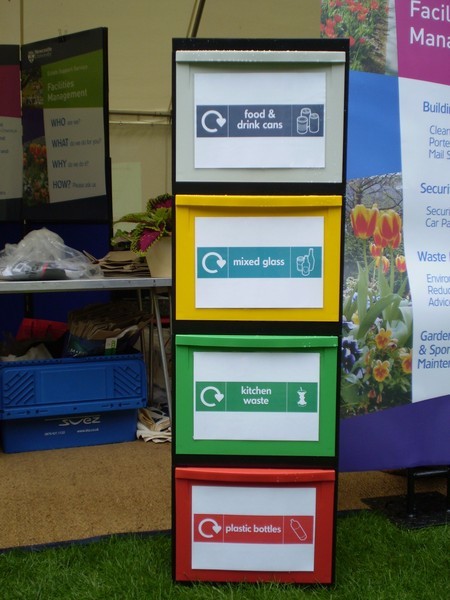Newcastle University
Newcastle University’s reputation stems from being one of the UK’s leading research intensive Universities, so it’s only right that we are making the commitment to environmental sustainability through a variety of initiatives with dedicated members of staff.
Sustainability Strategy
Newcastle University have taken a unique approach to producing their Sustainability Strategy.
Consultants, The KSA Partnership, were bought in by the Environment and Sustainability Committee to facilitate the strategy’s development, and having interviewed members of the committee, a consultation event was set up with the Environmental Coordinators (EC’s) from each of the 42 Schools.
The first draft of the strategy is now almost complete following further consultation for comparison with two Universities, two non HE and non-regional exemplars and two regional employers, One North East and Newcastle City Council. The final document will be recommended to council in April 2008.
Environmental Coordinators
The University has successfully written a role description for members of staff to be named Environmental Coordinators. Having had Faculty PVC approval for this role, all 42 Heads of School were asked to nominate a staff member who would be required when necessary to commit ½ - 1 day a month to assist the Energy Manager and Waste Manager in highlighting problems in their areas and implementing projects and campaigns. The EC’s give the Energy Manager and Waste Manager the insight and communication channel that is needed to highlight problems and successfully implement solutions in the dynamic environment of the University.
Energy Management
The University is now part of the current phase of the Higher Education Carbon Management Plan (HECM). The HECM provides a structured approach to calculating the University's carbon emissions baseline and to developing a Strategy and Implementation Plan to reduce those emissions. As well as an emissions baseline, the objectives of the HECM process will be to set a challenging, achievable target for CO2 emissions reduction; production of a Carbon Management Plan that demonstrates the business case for energy efficiency investment; developing and improving systems for recording Carbon Dioxide emissions across University operations and ensuring carbon management is embedded in University strategy development, business planning and project management procedures. It will also focus on engaging with students and staff in the drive to reduce CO2 emissions by establishing an energy awareness campaign in conjunction with the Union Society and Environmental Coordinators.
Waste Management
Due to the age and design of some of the buildings space is often restricted for locating internal recycling facilities. Having trialled the recycling modules (see picture), they are set to roll out to other areas around campus. With a footprint of just 400x300mm and a height of 1310mm (4 modules) they can fit into small areas and under worktops without taking up too much space.
These modules will compliment the external recycling bins and internal foyer recycling bins currently being rolled out around campus to collect newspapers, plastic bottles and cans.
In addition, money has just been awarded to the purchase of an in-vessel composter to collect catering waste and kitchen waste from offices. The money was generated through massive savings that were made on water bills over recent years.
Furthermore, a trial is also being carried out to reduce clinical waste tonnage by finding alternative containers. Presently clinical waste is disposed in yellow plastic bags or bins. Although sent to an Energy from Waste plant, the University would like to reduce the amount of plastic and therefore resource use by using a lighter, plastic film coated cardboard bin, similar to that of a juice or milk carton. It is estimated that over 600kg of plastic could be saved alone with the new system, which has the potential to increase as other sizes of the container come onto the market.
Transport
The University Travel Plan was submitted to Newcastle City Council in November 2006 representing a co-ordinated approach with the council and Northumbria University. It includes a range of targets relating to reduction in car travel to campus, improving sustainable transport alternatives, improving the accessibility of campus and reducing the local impact of necessary traffic, reducing emissions.
The University’s Discounted Public Transport scheme has been a great success. Two staff travel surveys have been undertaken, one in 2004 and another in 2006. The 2006 survey showed an increase in the proportion of staff using sustainable means of transport to work (57.2%) from 2004 (46%), including public transport, cycling and walking.
Biodiversity
The University’s Grounds Manager is currently developing schemes to increase biodiversity around campus. One such scheme will see the development of woodland surrounding the outdoor sports facilities into a diverse and supportive habitat. Actions include leaving dead wood piles and log heaps to attract insects, fungi and hedgehogs, stone heaps for small rodents and spiders, developing the green banks as wildflower meadows, planting hedgerow habitats and providing nesting boxes for birds and bats. The scheme will use the expertise of students from the School of Biology and the local Wildlife Trust and will engage with local primary school children who will be invited to help develop the scheme.
Main Contact Name: Sarah Boulger, Waste Manager
Main Contact Email & Telephone: sarah.boulger@ncl.ac.uk and 0191 222 3963
Further information/website: www.ncl.ac.uk/sustainability
Share with us: www.twitter.com/nclsustainable
www.facebook.com/SustainabilityNCL











